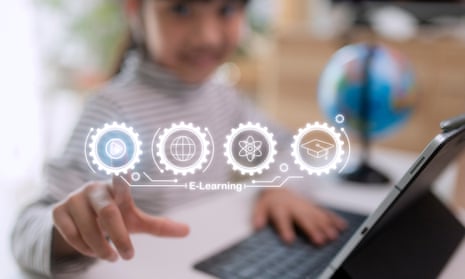Australian schools are “flying blind” and lagging globally on the use of artificial technology in classrooms, the author of a report on edtech has argued.
Leslie Loble, industry professor at the University of Technology, Sydney, said countries such as the UK, the US and Singapore were investing in education tools focused on special needs, websites with independent evaluation of tools and investment in AI technology specifically for learning.
Sign up for Guardian Australia’s free morning and afternoon email newsletters for your daily news roundup
“Whether it’s ChatGPT or other technology, the education sector [in Australia] at the moment is largely flying blind,” she said.
Her report for UTS and the Paul Ramsay Foundation, released in December, said edtech could be used to improve learning outcomes, particularly for disadvantaged students, but in Australia it lacked proper evidence and oversight.
ChatGPT, which generates text on any subject in response to a prompt or query, has caused alarm over the potential for misuse as well as enthusiasm for its potential to help some students. It has been banned in New York public schools due to concerns over its “negative impact on student learning” and potential for plagiarism.
On Tuesday Australia’s leading universities said they had revised how they would run assessments this year due to the emerging technology, including by returning to pen-and-paper exams.
The president of the New South Wales Teachers Federation, Angelo Gavrielatos, said the capacity to use artificial technology to plagiarise, coupled with prolonged learning from home during Covid lockdowns, highlighted the need for a “more comprehensive” interrogation of the “rise and rise” of edtech in the classroom.
“Teachers must be at the heart of this discussion,” he said. “Edtech and ultimately what is taught in schools, how it is taught and how our schools are organised cannot be determined by large global corporations driven by the profit motive.”
Loble, who served as a deputy secretary in the NSW education department for 20 years, said the pandemic had “turbocharged” the use of digital tools in classrooms, without providing greater information and evidence to parents and teachers about what was on offer.
“We don’t have governance systems to ask tough questions that would give us confidence technology being used was the best quality and going to lift education outcomes, particularly for disadvantaged and vulnerable students,” she said.
Loble said edtech used in public sector schools was decided by a procurement process, with a “great deal” marketed directly to schools without a central mechanism.
“We need clear standards that apply across the board … expectations for safe and ethical tools and quality of them,” she said. “What data is collected, who gets that data, is it monetised and on-sold? We’re having to adjust on fly.”
Of particular concern was the digital divide, which could be exacerbated as learning applications became a bigger part of student curriculums.
“Australia really needs to get on top of this,” she said. “We could be a leading nation shaping technology, not just taking it. Tech is way out in front of where our policies are … that’s why there’s an urgency to act.”
after newsletter promotion
For those who support students to write driving questions for personal interest projects, or for teachers needing to write driving questions for project based learning units, here’s a sample of how #ChatGTP can help. #AIinEducation pic.twitter.com/Gc3VCkE5s7
— Pip Cleaves (@pipcleaves) January 8, 2023
A spokesperson for the NSW Department of Education said it took cheating and malpractice in academic work and exams “very seriously”.
“We continue to investigate and explore the impact emerging digital technologies and tools have on student learning and assessment, including AI,” it said.
Victoria’s Department of Education said it was “reviewing the risks” of artificial intelligence tools and would “consider appropriate actions”.
The chief executive of the Queensland Curriculum and Assessment Authority, Jacqueline Wilton, said it worked “proactively” to promote awareness of academic integrity and was “continuing to monitor the impact and potential of AI tools”.
Others have already integrated artificial intelligence, including ChatGPT, into their curriculums.
---"ChatGPT has given me the ability to learn the best way I can, by having a conversation and doing."--
— Curt Doolittle (@curtdoolittle) January 8, 2023
Exactly. pic.twitter.com/un2Kbxo2nz
Neha Samar, the head of a mentorship program called the Flamingo Project, has been using the technology with disadvantaged high school students, and said it had lifted their mood and driven classroom engagement.
“It adds so much confidence,” she said.
“So many learners have anxiety and other mental health issues and this helps them be creative and think outside of the box without having to show their face or use their voice. And ChatGPT helps them bring ideas to words.”
